
Carolina Wrens Delight
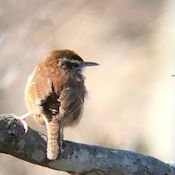
Carolina wrens (Thryothorus ludovicianus) delight us year-round with their rich musical song. They are common in surburbia and in the undergrowth of deciduous and mixed woods and along forest edges. Jason Yee shared his photographs of these beautiful birds, photos he took on the February 5, 2017, FODM bird walk.
Celebrating FODM’s 40th and NPS’s 100th

On October 2, 2016, 125 friends and supporters of the Dyke Marsh Wildlife Preserve (photo by Ned Stone) celebrated the 40th anniversary of the Friends of Dyke Marsh, the 100th anniversary of the U.S. National Park Service and the start of marsh restoration. FODM thanks the many generous members, friends, volunteers, sponsors and donors who made the celebration possible. See the lists below.
Honors Come to FODM

At FODM’s October 2, 2016, 40th anniversary celebration, Virginia Senators Adam Ebbin and Scott Surovell and Delegates Paul Krizek, Mark Levine and Mark Sickles presented a resolution honoring FODM’s 40 years of stewardship. The Virginia General Assembly (building, photo) passed the resolution on March 10, 2016.
FODM Urges Fairfax County to Stop Pesticide Spraying
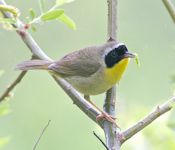
Beginning in 2000 and for several years since, Fairfax County has sprayed over thousands of acres targeting a native moth caterpillar called the fall cankerworm (Alsophila pometaria). The National Park Service does not spray its properties, but a phenomenon known as “pesticide drift” can occur and chemicals can end up on unintended properties. We estimate that at least 110 kinds of butterfly and moth caterpillars are at risk of being killed by this insecticide.
Lingering or Wintering Warblers?
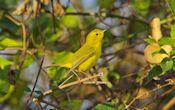
Wilson’s Warbler
In early December 2016, sharp observers spotted two warblers in the Dyke Marsh Wildlife Preserve, birds that normally would be much further south in December.
A Wilson’s warbler (Cardellina pusilla) (photo by Ed Eder), a beautiful citrine yellow, long-distance migrant is apparently overwintering in the marsh.
Another Rare Winter Visitor, the Baltimore Oriole
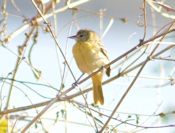
In mid-December 2016, FODMers spotted a Baltimore oriole (Icterus galbula) in Dyke Marsh, a rare winter sighting in Northern Virginia. These birds typically migrate to Mexico, Central America and Cuba during the winter months and are likely vagrants here that have either failed to migrate or have stopped short of their final migration destination.
Restoring, Sustaining Productive Ecosystems
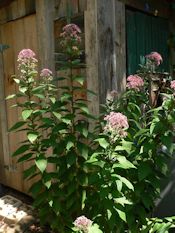
We can bring back functional ecosystems, Dr. Doug Tallamy explains in “Hometown Habitat,” a film that FODM featured at the November 16, 2016, meeting. He describes the effort as “healing the Earth, one yard at a time.” Dr. Tallamy is Professor and Chair of Entomology and Wildlife Ecology at the University of Delaware and the author of Bringing Nature Home.
A Multi-sensory Walk in Dyke Marsh
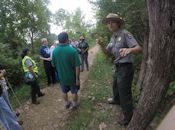
FODMers Jessie Strother and Ned Stone helped National Park Service staff lead a multi-sensory nature walk for low-vision and blind people in Dyke Marsh on September 24, 2016. The group was led by Park Ranger Rachel LeQuire ( photo, by Mary Bielamowicz). As the group of 15 walked along the Haul Road trail, they felt tree bark, snake skins and animal pelts.
FODMers Learn about Plants from an Expert
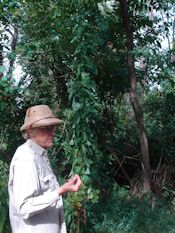
On Saturday morning, September 3, 2016, as Hurricane Hermine pounded Virginia’s coast, 25 FODMers studied the plants of Dyke Marsh on a windy, “rainless,” three-hour walk. “At least there’ll be fewer mosquitoes,” quipped walk leader Dr. Elizabeth Wells, Associate Professor Emerita of Botany at the George Washington University. Her commentary was engaging and wide ranging, covering plant taxonomy, reproduction, structure, pollination, predation, host plants and more.
STEM Students Visit Dyke Marsh
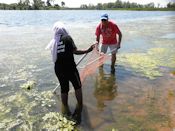
On July 14, 2016, FODM hosted 25 George Washington Middle School students participating in the Alexandria Public Schools’ summer STEM (science, technology, engineering and mathematics) program and two of their teachers. The students learned about the natural resources of Dyke Marsh and conducted some water testing using seine nets.
Snake Sightings
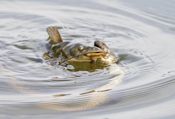
Two species of snake are often seen in Dyke Marsh in the summer.
On July 1, 2016, during a canoe trip in the southern part of Dyke Marsh, FODMers saw an encounter between a common water snake (Nerodia sipedon sipedon) and a catfish. Also called the northern water snake, it is probably the most abundant snake in Dyke Marsh.
These photos (by Ed Eder) indicate how the prey was snared in deeper water and dragged to the shore by a very determined snake.
FODMers Help With National BioBlitz
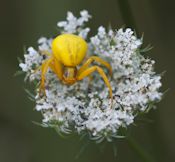
During the May 20 and 21, 2016, national BioBlitz, FODMers, National Park Service (NPS) staff and friends identified 13 new spider species in the Dyke Marsh-Belle Haven Park area. Other records for Dyke Marsh: the first spring record for a Philadelphia vireo (Vireo philadelphicus); the second record for the hoary bat (Lasiurus cinereus); one new earthworm (Bimastos palustris), a native species; and two new terrestrial isopods (Porcellio laevis, Trichoniscus pusillus). At our “sister” park, Theodore Roosevelt Island, people found 17 new lichens.


AlbertHerring-b4cc6b5cfb.jpg)



 Friends of Dyke Marsh, Inc. is a non-profit 501(c)(3) organization.
Friends of Dyke Marsh, Inc. is a non-profit 501(c)(3) organization.